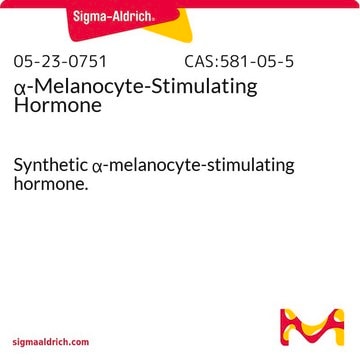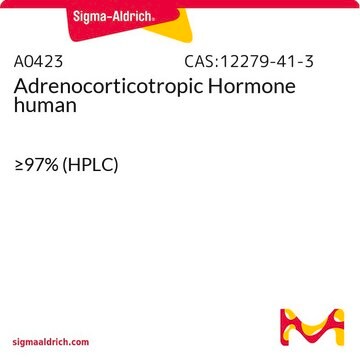M0939
Anti-α-MSH antibody produced in rabbit
IgG fraction of antiserum, buffered aqueous solution
Sinónimos:
Anti-α-Melanocyte Stimulating Hormone
About This Item
Productos recomendados
biological source
rabbit
Quality Level
conjugate
unconjugated
antibody form
IgG fraction of antiserum
antibody product type
primary antibodies
clone
polyclonal
form
buffered aqueous solution
mol wt
antigen 1664.9 kDa
species reactivity
human
technique(s)
ELISA: 1:4,000
microarray: suitable
UniProt accession no.
shipped in
dry ice
storage temp.
−20°C
target post-translational modification
unmodified
Gene Information
human ... POMC(5443)
Categorías relacionadas
General description
Immunogen
Application
- immunohistochemistry
- radioimmunoassay/α-MSH immunoassay
- enzyme linked immunosorbent assay (ELISA)
Biochem/physiol Actions
Physical form
Disclaimer
¿No encuentra el producto adecuado?
Pruebe nuestro Herramienta de selección de productos.
Storage Class
12 - Non Combustible Liquids
wgk_germany
WGK 2
flash_point_f
Not applicable
flash_point_c
Not applicable
Elija entre una de las versiones más recientes:
Certificados de análisis (COA)
¿No ve la versión correcta?
Si necesita una versión concreta, puede buscar un certificado específico por el número de lote.
¿Ya tiene este producto?
Encuentre la documentación para los productos que ha comprado recientemente en la Biblioteca de documentos.
Nuestro equipo de científicos tiene experiencia en todas las áreas de investigación: Ciencias de la vida, Ciencia de los materiales, Síntesis química, Cromatografía, Analítica y muchas otras.
Póngase en contacto con el Servicio técnico


![[Nle4, D-Phe7]-α-Melanocyte Stimulating Hormone trifluoroacetate salt ≥95% (HPLC)](/deepweb/assets/sigmaaldrich/product/structures/276/187/9733edf4-6412-4f2b-8cc6-c3f9f3425d4d/640/9733edf4-6412-4f2b-8cc6-c3f9f3425d4d.png)





